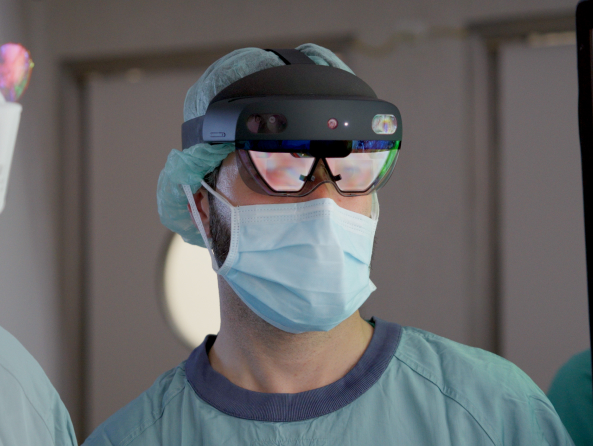Discover the power of VSI HoloMedicine®, apoQlar medical’s ground-breaking, mixed reality software transforming surgical planning, image interpretation and collaborative medicine. Leveraging the latest technology in, mixed reality for surgical planning, artificial intelligence (AI), 3D holographic imaging, the VSI HoloMedicine® software is device and cloud agnostic – running on all major MR devices and cloud platforms.
VSI HoloMedicine® takes surgeons beyond 2D scans into an immersive 3D environment, allowing for greater understanding and interpretation of spatial relationships between anatomy. The software instantly transforms your patient’s 2D DICOM data into 3D holograms allowing you to adjust, interact with, measure, annotate and do much more with your 3D models. Take away the challenges of anatomical variations and incomplete pictures for surgical planning.
VSI HoloMedicine® includes a number of tools that surgeons can use to perform virtual trajectory and resection plans. From simple tools such as drawing and shapes, all the way to resection planning and volumetric calculations. VSI HoloMedicine® simplifies and enhances the pre-operative planning process.
The R&D and education versions of VSI HoloMedicine® include an AI segmentation model for liver, with a lung AI segmentation model to launch later in the year. This means that with a click of a button, DICOM data can be automatically transformed into 3D segmented models without any need of assistance from the radiology department.
VSI HoloMedicine® creates a collaborative environment within MR or VR where healthcare professionals can share cases, medical data and STL objects either in the same room or remotely across the globe. Through teams integration and the shared experience function, up to five participants can simultaneously manipulate and communicate to ensure patient treatment is of the highest standard.
In the realm of surgical planning, understanding the distinctions between virtual reality (VR) and mixed reality (MR) is crucial. Virtual reality creates fully immersive environments that surgeons can navigate using specialized headsets, allowing them to explore patient anatomy and related data in a simulated space. On the other hand, mixed reality for surgical planning merges virtual elements with the real world, overlaying digital information onto a surgeon’s actual view of a patient or their surroundings. Both VR and MR offer powerful tools in surgical planning, each catering to distinct needs and enhancing the overall efficacy of medical procedures.
Common use cases
Common use cases
